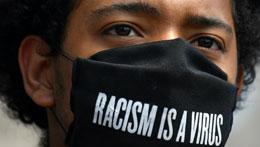Inquiry into BC’s pandemic of hate

By Mata Press Service
British Columbia’s first public human rights inquiry will examine the disturbing surge of hate during the pandemic in a year-long public inquiry to establish facts and make recommendations for change.
“It is critical for all of us to be better prepared to prevent and respond to hate during global health, economic and social crises to protect our human rights during turbulent times,” said BC Human Rights Commissioner, Kasari Govender.
“Many of us are uncomfortable acknowledging hate because we want to think of our country as a peaceful, respectful place. The truth is that hate is here, and it is growing,” she said.
“Fear and ignorance underlie much of the rise of hate and white supremacy in B.C. Combating hate in all its forms requires addressing fear, systemic inequality and ignorance through an evidence-based approach to change.”
BC’s Office of the Human Rights Commissioner (BCOHRC) has been monitoring hate incidents as part of its core strategic priority work on hate and white supremacy.
Since early 2020, there has been a significant increase in reported hate-related incidents in B.C., highlighting an urgent need for an Inquiry into Hate in the Pandemic, said BCOHRC.
Since the onset of the pandemic, there have been more than 1,500 incidents of anti-Asian racism reported to elimin8hate.org and covidracism.ca, and B.C. continues to report the most incidents per capita in North America, according to a report distributed by Canadian Press.
In 2020, police-reported hate crimes in Canada targeting Indigenous Peoples increased 152 percent compared to 2019, the report said.
The intent of the inquiry is to examine hate in all its forms: not only racism and racial hate, but also hate directed at groups protected under B.C.’s Human Rights Code. For example, hate perpetrated on the basis of religion, gender identity, disability, Indigeneity, sexual orientation, poverty or homelessness.
A public inquiry is an official review of major events or issues to establish facts and make recommendations for change. It is an opportunity to delve deeply into the human rights implications of a particular incident or issue, to gather factual and expert evidence, to hear directly from people impacted through witness statements or surveys and to make recommendations to address the human rights issues raised. An inquiry is not a court of law and cannot make legal findings of guilt or liability or compel governments to accept inquiry recommendations.
This inquiry will take the form of a year-long investigation, and is the first conducted by an independent human rights commissioner in B.C.
Inquiry submissions open this fall.
Due to the challenging nature of the inquiry topic, the BCOHRC will not hold open public hearings. Instead, it will solicit expert and public testimony virtually to protect privacy and embed trauma-informed practices. The Office will inform the public on how they can participate in the Inquiry later this fall once the submission period formally opens.
In preparing the inquiry, the BCOHRC consulted 23 community groups with important insights into hate.
With their input, BCOHRC decided to focus its investigation on what has caused an apparent rise in hate incidents in B.C. during the pandemic, what kinds of hate individuals and communities have experienced, how it can be addressed, eliminate or prevent hate in times of crisis and how well BC institutions, policies and laws have responded.
At the close of the Inquiry, the Commissioner will release a final report with recommendations to address, prevent and manage outbreaks of hate during times of social upheaval now, during the COVID-19 pandemic and in future.









